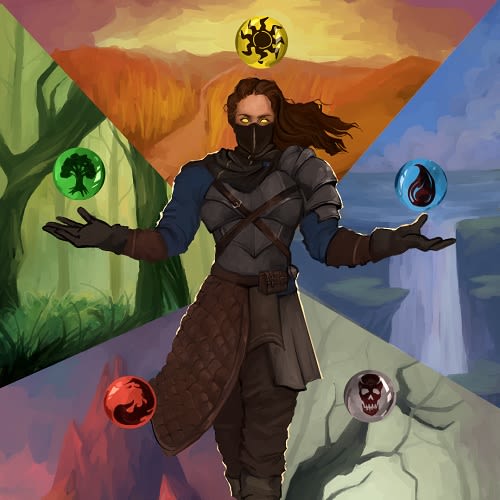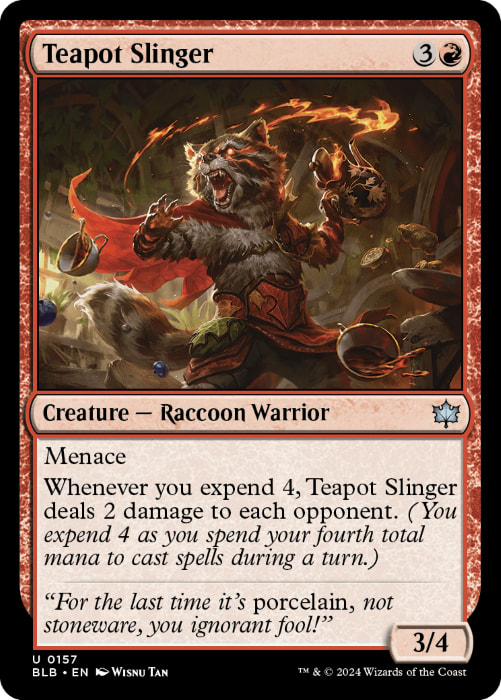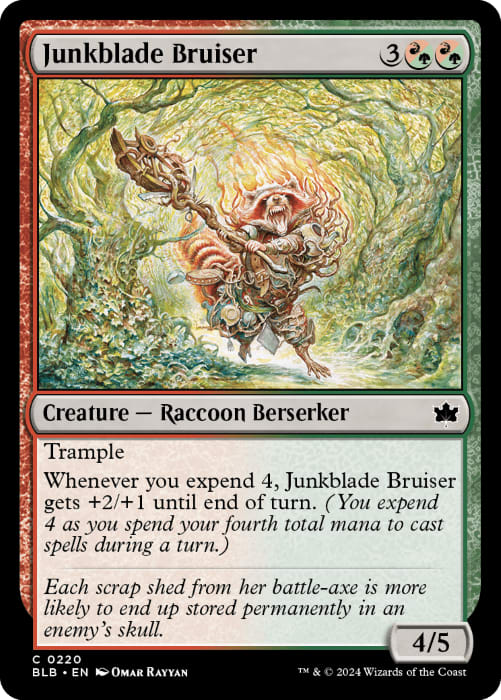Bloomburrow, the newest upcoming Magic: The Gathering set, is right around the corner. With it, you can expect to see rabbits, mice, frogs, and all manner of woodland creatures scattered across tables at your local game store. You'll also find some new mechanics to assist your furry friends in embracing their full potential. I'm Luka Sharaska, and today I'm explaining the new expend mechanic.
How Does Expend Work?
Expend is tied to a number, and once you've used that much mana to cast spells, you get an extra effect. While it might seem simple, there are a few caveats that you should try to remember to make sure you don't make any mistakes:
- Expend only happens once each turn for each game object with expend.
- You can cast any number of spells in order to reach the expend threshold. Four 1-mana spells will satisfy expend 4. Eight 0-mana spells or one 10-mana spell will satisfy expend 8, and so on.
- If you spend four mana to cast a spell with expend 4, you won't be able to trigger the expend ability on that card that turn.
- Expend only cares about mana spent to cast spells. This includes additional costs like offspring or kicker, since those are additional costs to cast, but not activated abilities, triggered abilities, or paying for a card like Mana Leak.
- Expend-related abilities will go on the stack as soon as you cast the spell that spends the appropriate amount of mana, and will resolve before that spell.
- Your spell doesn't have to resolve, or be cast from your hand, in order for expend to work. As long as you spend the mana to cast the spell, you're good to go.
- Expend is only found on Green, Red, and Gruul cards.
Now that we've covered the basics of the rules, let's go into how these cards will actually function during a normal game of Magic.
How Good Is Expend?
Typically when a mechanic rewards players for doing something they already want to do, that mechanic plays quite well. Also, this is yet another mechanic that reinforces the Limited heuristic of cheaper cards being better, as I believe that most of the cheap expend cards are better than their more expensive alternatives.
While expend only appears on 10 cards in the main set, you aren't getting paid off for collecting cards that say it. Simply put, you could play just one expend card without worrying about the mechanic playing poorly in your deck. Another fact is that it's really hard to play a game of Magic where you just don't cast spells. In Limited and Standard, almost every deck has a good concentration of spells that will satisfy the most common expend threshold. Speaking of which...
What's The Most Common Expend Number?
Expend 4 is by far the most common number you'll see, but it's not the only one, even if it is the only expend number at common and uncommon. That said, 4 sits at the sweet spot where most decks won't be playing too many spells at that cost or higher. This is pretty clever work by the designers, if you ask me. Just as clever, about half of the expend cards boost power and toughness in some way, giving you options when it comes to casting spells before or during combat.
The higher the expend number, the harder it will be to reach that goal each turn, or at all. This is doubly true if your expend card can't trigger the turn you play it. Thankfully, card draw and mechanics like offspring combine wonderfully with expend, so be on the lookout for both. Just as well, you may be inclined to add an extra card or two that can hit your expend thresholds on their own.
The handsome raccoon above is Byway Barterer, and the first thing I noticed about this card is that the expend number is higher than the mana value. In fact, most expend cards cost less than their expend number. These play quite a bit different than cards where the opposite is true, especially in the late game, where you have a chance to play your expend card and cast another spell to get that value immediately.
With this in mind, you can sandbag a less significant spell in the late game to make some expend cards a little better. Temper your willingness to do so in accordance with how valuable the effect is. In the case of Byway Barterer, discarding your hand means very little if it's empty, and drawing two fresh cards can swing the game in your favor or push you further ahead.
Conclusion
Overall, I think that expend has a lot of unexplored design space that we'll see explored in the future. For now, we'll have to make do with the few we get here, and I hope you've enjoyed this short exploration of the expend mechanic.
Be sure to check out the other Bloomburrow mechanic guides!
- Bloomburrow Mechanics: Gift - Mark Wischkaemper
- The Mechanics of Bloomburrow: Offspring - Levi Perry
- The Mechanics of Bloomburrow: Valiant - Mark Wischkaemper
- The Mechanics of Bloomburrow: Forage - Mark Wischkaemper



























